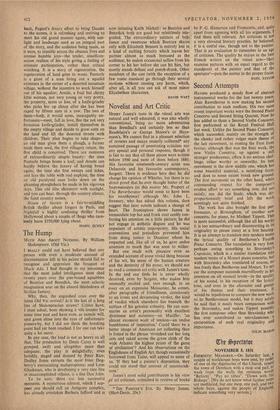The Hump
MUCH ADO ABOUT NOTHING. By William Shakespeare. (Old Vic.) I REALLY could not have believed that any person with even a moderate amount of discrimination left in his palate should fail to recognise and appreciate the bouquet of Much Ado. I had thought in my innocence that the most jaded intelligence must shed twenty years over the pun-bound squabbles of Beatrice and Benedick, the most eclectic imagination soar on the absurd thistledown of Sicilian fantasy.
Why, then, the anguished cries over the latest Old Vic revival? Is it the last of a long line of Shakespearian straws? Critics have, I must admit, been showing a vile temper for some time past and have even, as camels will, spat green slime into the eyes of unfortunate passers-by, but I did not think the breaking point had yet been reached. I for one can take quite a lot more.
In any case, the load is not as heavy as all that. The production by Denis Carey is well grouped, swift and altogether more than adequate; the play is delightfully, even lavishly, staged and dressed by Peter Rice; Dudley Jones extracts the most from Dog- berry's excruciating malapropisms; and Leon Gluckman, who is developing a very nice line in unaccomplished villains, is a fine Don John.
To be sure, there are less successful moments. A mysterious ailment, which I sup- pose one should, call an Antigone complex, has already overtaken Barbara Jefford and is now infecting Keith Michell: as Beatrice and Benedick both are good but relentlessly mis- guided. The extraordinary mixture of bril- liance and sweetness which Beatrice shares only with Elizabeth Bennett is entirely lost in a kind of melting ferocity which leaves her partner almost as much bemused as the audience; he makes occasional sallies from his corner to hit her before she can hit him, but mostly stands defiant and punch-drunk. Other members of the cast (with the exception of a few rustic maniacs) go through their several motions without causing any harm, which, after all, is all you can ask of most minor Elizabethan characters.
DAVID WATT


































 Previous page
Previous page